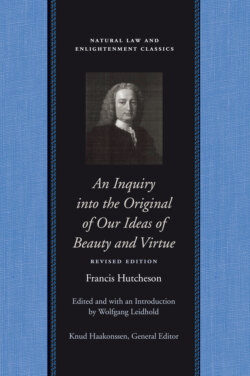Читать книгу An Inquiry into the Original of Our Ideas of Beauty and Virtue - Francis Hutcheson - Страница 11
На сайте Литреса книга снята с продажи.
ОглавлениеAn Inquiry into the Original of Our Ideas of Beauty and Virtue
In Two Treatises.
||1I. Concerning Beauty, Order, Harmony, Design. II. Concerning Moral Good and Evil.|| The Second Edition, Corrected and Enlarg’d.
Itaque eorum ipsorum quae aspectu sentiuntur, nullum aliud animal pulchritudinem, venustatem, convenientiam partium sentit. Quam similitudinem natura ratioque ab oculis ad animum transferens, multo etiam magis pulchritudinem, constantiam, ordinem in consiliis, factisque conservandum putat. Quibus ex rebus conflatur & efficitur id quod quaerimus honestum: Quod etiamsi nobilitatum non sit, tamen honestum sit: quodque etiamsi à nullo laudetur, naturâ est laudabile. Formam quidem ipsam & ||2tanquam|| faciem honesti vides, quae si oculis cerneretur, mirabiles amores excitaret sapientiae.
—Cic. de Off. lib. I. c. 4.i
London: 1726.
3To His Excellency, John, Lord Carteret,ii Lord Lieutenant of Ireland.
May it please your Excellency,
When I publish’d these Papers, I had so little Confidence of their Success, that I was unwilling to own them; and [iv] what I was unwilling myself to own, I durst not presume to inscribe to any great Name.
Your Excellency’s favourable Reception of them, soon put me out of all Fears about their Success with the wiser and better Part of the World; and since this has given me Assurance to own them, I humbly presume to inscribe them in this second Edition to your Excellency, that I may have at once an Opportunity of expressing the sincerest Gratitude for the Notice you were pleas’d to take of me, and have the Pleasure also of letting the [v] World know that this small Work has your Excellency’s Approbation.
The Praise bestow’d by Persons of real Merit and Discernment, is allow’d by all to give a noble and rational Pleasure. Your Excellency first made me feel this in the most lively manner; and it will be a Pleasure as lasting as it is great: ’twill ever be matter of the highest Joy and Satisfaction to me, that I am Author of a Book my Lord Carteret approves.
I know, my Lord, that much of your Commendation [vi] is to be attributed to your own Humanity: you can entirely approve the Works of those alone, who can think and speak on these Subjects as justly as your self; and that is what few, if any, even of those who spend their Lives in such Contemplations, are able to do. In the Conversation, with which your Excellency has been pleas’d to honour me, I could not, I own, without the utmost surprize, observe so intimate an Acquaintance with the most valuable Writings of contemplative Men, Antient, and Modern; so just a Taste of what is excellent in the ingenious Arts, [vii] in so young a man, amidst the Hurry of an active Life. Forgive me, my Lord, that ||4I|| mention this part of your Character: ’tis so uncommon that it deserves the highest Admiration; and ’tis the only one which an obscure Philosopher, who has receiv’d the greatest Obligations from your Excellency, can with any Propriety take notice of.
Those other great Endowments which have enabled you, even in Youth, to discharge the most difficult Employments, with the highest Honour to your self, and Advantage to your Country, I dare not presume to de-[viii]scribe. He who attempts to do Justice to so great and good a Character, ought himself to be one of uncommon Merit and Distinction: and yet the ablest Panegyrist would find it difficult to add any thing to your Excellency’s Fame. The Voices of Nations proclaim your Worth. I am,
May it please your Excellency,
Your most obliged,
Most obedient, and
Most devoted humble Servant,
Dublin,
June 19.
1725.
Francis Hutcheson. [ix]
